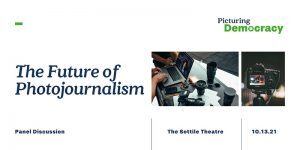Events
The Future of Photojournalism Panel Discussion to be held at the Sottile Theatre

Join moderator Tara Mortensen and panelists Kyser Lough, Sean Rayford, and Cecil Williams for a discussion about the challenges photojournalists face in the current media environment. How do the ethics and practices of staffed, professional photojournalists differ from non-staff photographers who fill in the gaps? What are the consequences of the de-professionalization of photojournalism? What does the future of photojournalism look like?
The event is free and open to the public. Registration and masks are required. Click here to register.
Dr. Tara Marie Mortensen
Dr. Tara Mortensen studies visual communication, media sociology, de-professionalization of visual journalism, amateur photography and user-generated (visual) content. Dr. Mortensen currently serves as Associate Professor in the School of Journalism and Mass Communications at the University of South Carolina – Columbia.
Her recent publications include “From Confrontations to Civil Liberties: Newspaper Photo Framing of Police Brutality and Riots in Los Angeles 1992 and Ferguson“ and “Does photojournalism matter? A content analysis of photojournalism in the Times Herald-Record before and after layoffs of the photojournalism staff.”
Dr. Mortensen holds a B.A. in Mass Communication from Black Hills State University, an M.S. in Journalism from South Dakota State University, and a Ph.D. in Journalism from the University of Oklahoma.
Dr. Kyser Lough
Dr. Kyser Lough is an assistant professor of journalism at the University of Georgia, where he researches visual communication and solutions journalism, both with an emphasis on photojournalism. He aims to advance the field of visual journalism further by incorporating his work into professional, research and classroom spaces.
He obtained his PhD in journalism from the University of Texas at Austin, and an MA in mass communication from Murray State University. Dr. Lough spent 10 years as a photojournalist, reporter and public relations practitioner before stepping into academia. He continues to freelance as a photographer in Athens and specializes in music and sports photography.
His research explores questions of power, access and boundaries. Within visual communication, he studies how news images are made, selected and interpreted, as well as the photographers themselves in how they define and operate within their field as they fight for legitimacy and job security. His solutions journalism work investigates how it is conceptualized/created, audience effects and the interplay of words and images. Solutions journalism, a growing field of interest within journalism studies, compels journalists to go beyond just reporting about problems in a community by also covering what people are doing about it.
Sean Rayford
Sean Rayford is a freelance photojournalist living in Columbia, SC working with Getty Images, The New York Times, the Associated Press and many others. He is a 2001 graduate of the University of South Carolina where spent most of his time in student media at the Gamecock newspaper and WUSC.
Before becoming a full time photographer, Rayford tended bar at a live music venue for more than a decade. He likes riding bicycles, running and interesting weather.
Some of his photographs are currently part of the “Hindshight 20/20” exhibit at the Columbia Museum of Art. You can see his work at sodacitizen.com, seanrayford.com and instagram.com/theangrywhale.
Cecil Williams
Cecil Williams, a native of Orangeburg, is the founder of the Cecil Williams South Carolina Civil Rights Museum, the first and only civil rights museum in the Palmetto State.
His childhood experiences and background inspired him to have the audacity to attempt creating this entity using mostly his own resources.
At nine years old, Williams, acquired his first camera, a hand-me-down Kodak Baby Brownie. His first “magic box” enabled him to earn $1 photographing families visiting Edisto Gardens dressed in their best Sunday attire. After his mother helped purchase his second camera, he set up a darkroom in his home to process photos. Those experiences molded him in becoming a photojournalist and lifelong career in photography.
In 2016, he designed the “Filmtoaster,” an apparatus that uses digital technology to rapidly scan large volumes of film. Under a project funded by Gaylord Donnelley Foundation, Williams directed a project at Claflin University, where using his invention, student interns were employed to scan thousands of historically significant film.
He is the author of 5 civil rights movement era publications and recipient of the coveted Vernor Award in the Arts and Order of the Palmetto.
South Carolina Humanities
The mission of SC Humanities is to enrich the cultural and intellectual lives of all South Carolinians. Established in 1973, this 501(c) 3 organization is governed by a volunteer Board of Directors comprised of community leaders from throughout the state. It presents and/or supports literary initiatives, lectures, exhibits, festivals, publications, oral history projects, videos and other humanities-based experiences that directly or indirectly reach more than 250,000 citizens annually. Visit www.schumanities.org for more information.
























